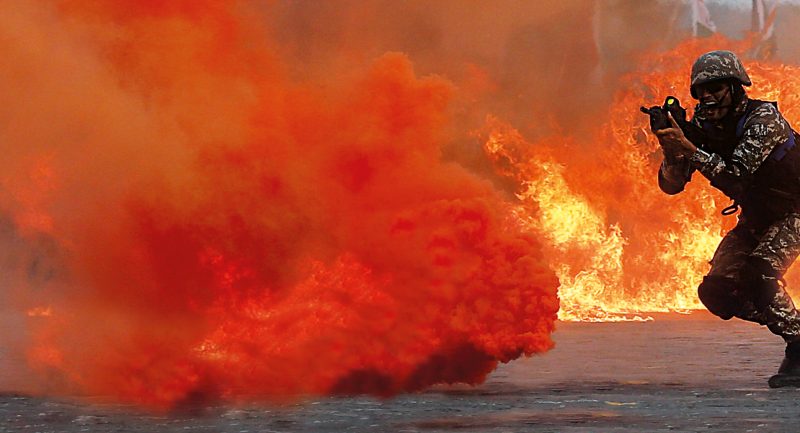
India’s magnificent plurality can not be contained in a homogenous sentence that favours only one side of the scale. Taking up this monumental challenge is Nidhi Razdan’s ‘Left, Right and Centre: The Idea of India’ that celebrates every aspect of the country, since its Independence 70 years ago.
In his essay ‘Through the Past into the Future’, Former Finance Minister, Yashwant Sinha, talks about the way forward despite all the major roadblocks a country of teeming billions faces every day. In spite of the many governments India has seen since its Independence, and in spite of all that it has achieved, Sinha highlights the pressing concerns that still keep the nation from being the superpower it deserves to be.
Here’s an excerpt from his essay.
It is debatable whether India has achieved all it should have in the seventy years since independence. On the one hand, we have sent the Mangalyaan to explore the planet Mars. Our space agency is capable of launching more than a 100 satellites together. We lead the rest of the world in information technology. Yet, there are hundreds if not thousands of villages which lack the basic amenities of life like an all-weather road, potable drinking water, proper sanitation and health facilities or proper schools. Unemployment continues to be a major problem.
Every government claims to have done its best to solve these problems yet they refuse to go away. Governments are always short on resources; the tax base does not expand despite inspector raj. Only the poor and the innocent are caught and the rich and famous get away. Millions of cases are pending in courts, the jails are full of undertrial prisoners, many of them having spent the maximum jail term which their crime may have merited. There are many ills from which we suffer today. We have miles to go before we rest. But what is the goal that we must set for ourselves for the remaining decades of this century and what are the means by which we can achieve it?
India must strive to reach the top of the league of nations— the top two or three in the world. That is our destiny and we must fulfil it. To arrive there, we must eradicate the bane of poverty, misery and deprivation in our society at the soonest. It is not difficult to achieve this goal.
Our two-pronged strategy should consist of high and sustained economic growth of around 8 per cent per annum for the next twenty years or so and a direct attack on poverty and deprivation. In an uncertain global scenario where globalization is on the retreat and economic nationalism is coming to the fore, we must depend on our own demand, our own resources and our own people to achieve the desired growth rate.
We have massive unmet demand in our economy. Our country is crying out for modern infrastructure. We must build lakhs of kilometres of roads of all kinds, national highways, state highways and rural roads, to connect our country and its people. We need irrigation works especially of the medium and the minor kind to irrigate our still-parched fields. We need all kinds of power, renewable and thermal, to light up our homes, irrigate our fields and run our factories. We need new towns and cities to provide for the population migrating from the rural areas into modern urban centres and to relieve the pressure on farmland and the villages, as well as the existing overcrowded and choking cities. Then, there is the issue of connectivity of these places with modern means of communication like railways and air services, telecom and fast Internet services.
Many more universities are needed and also other centres of excellence. Similarly new research facilities in science and technology are required to meet our growing needs. There is so much to do that the list can go on endlessly. All these activities will contribute to economic growth and generate employment. There will be no dearth of resources. People will always be ready to pay for the services they receive provided they are of quality and are uninterrupted. Resistance comes only when the services supplied are of poor quality and their regular supply is disrupted.
Our Constitution has given primacy to the individual not to the village. I do not know whether that is the reason for the neglect of the village. In the process the individual has also suffered. Is it possible, for a change, to accord primacy to the villages in our country and for the political class to take a vow that the improvement in the quality of the people living in them shall be the first charge on the nation’s resources?
A survey should be conducted in all the villages to find out what is lacking there in terms of basic amenities. We should then prepare time-bound plans to provide them with what they need in a pointed, directed manner much in the way in which the doctors treat cancer patients with radiation. In this way, we shall achieve our goal of improving the life of our fellow citizens within the same resources. Liberation of Indian villages from their wants must be our new battle cry.
Underlying all these activities on the nation building front is the need for political and governance reforms. I have already stated above how politics in this country reached its nadir with criminalization and the use of money power in the elections. Some improvement has taken place but a lot remains to be done. A beginning must be made with the democratization of political parties. Internal democracy within most political parties is becoming increasingly rare. Stricter laws, to be enforced by the Election Commission with the threat of de-recognition, are needed to force political parties to abide by these laws and rules.










